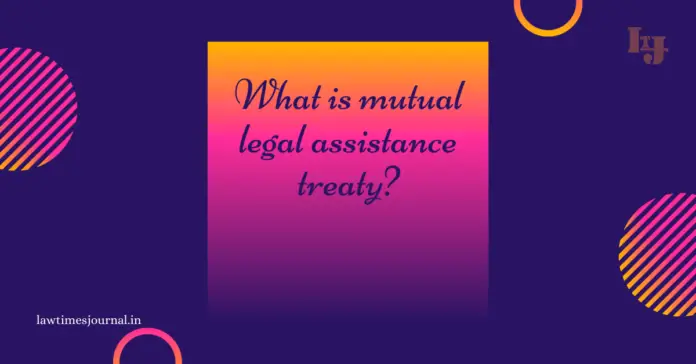
Today we are living in a world where we have advanced exponentially in the field of communication and data sharing, eliminating all the obstacles of borders and sharing the information to every corner of the world. The use of the internet has made all this possible. With the considerable increase in every sphere of human beings, it has led to an increase in criminal activities across the world. Criminals are using these methods to perform their illicit activities across the borders. This situation gives rise to international co-operation between the nations to combat and investigate such international criminal activities. All this has led to several treaties signed between nations for international co-operation in the criminal investigation.
Mutual Legal Assistance Treaty is an agreement between two countries for the purpose of co-operation in criminal matters. MLAT and other cross-border treaties are important for law enforcement. A crime committed in India may not be committed within the borders of India. Internet and electronic devices make it possible to commit the crime in one nation by being present in another country. This is the hurdle the investigative authorities face as such criminals are outside the jurisdiction of local investigative authorities.MLAT helps us during such times by allowing access to information and criminals in another country.
Mutual Legal Assistance Treaty allows one contracting party to receive information from another contracting party. MLATs enable them to receive valuable evidence against the criminal during the legal proceedings and allows co-operation in the investigation. The MLAT includes everything from nominating the authorities to whom such requests should be made. The type of information the contracting parties will share. MLATs play important role when the evidence sought by one contracting party is located in the jurisdiction of another contracting party. The nodal ministry and Central authority of India with respect to criminal law matters is the Ministry of Home Affairs and that in the case of civil and commercial matters is the Ministry of Law and Justice and any other person as designated by both the authorities. Therefore for any co-operation required from a foreign country regarding criminal matters is submitted to the Ministry of Home Affairs and the Ministry of Law & Justice in case of civil and commercial matters.
At times even such requests can be sent via the embassies/missions set up in foreign countries through diplomatic channels. The MLAT contains the nature of information and evidence to be shared, the service of summons and even receiving the criminal to be tried as per the jurisdiction of the party who seeks such information. MLATs are used by prosecutors, law enforcement agencies when they need to obtain various evidences and information from foreign countries.
India signed its first-ever Mutual Legal Assistance Treaty with Switzerland in the year 1989 and till now, India has signed MLAT in criminal with 39 countries with countries like The USA, United Kingdom, Canada, Russia and many other countries.[i]
All the MLAT’s signed contain different articles which mentions the Central Authority of both the countries, the scope of assistance to be provided, servicing of documents, servicing of bailable and non-bailable arrest warrants.
Article 1 contains the central authority of both the contracting parties. MLATs act as an important tool for law enforcement agencies, government and also private sector entities to receive information from a foreign jurisdiction. Also MLAT can allow access to data that would not be accessible to domestic investigations. It also helps the nations to bring justice to the citizens even when the offender is from foreign jurisdiction.
Conclusion
Mutual Legal Assistance Treaty are of great importance when dealing with criminals from foreign land which limits the law enforcements from accessing such information. Such treaties helps the countries to come together and develop strong international relations in matters of crime and also lay foundation for international law to be more stringent and act against such international criminals who affect multiple countries.
“The views of the authors are personal“
Reference
[i] (https://mea.gov.in/mutual-legal-assistance-in-criminal-matters.htm, n.d.)





